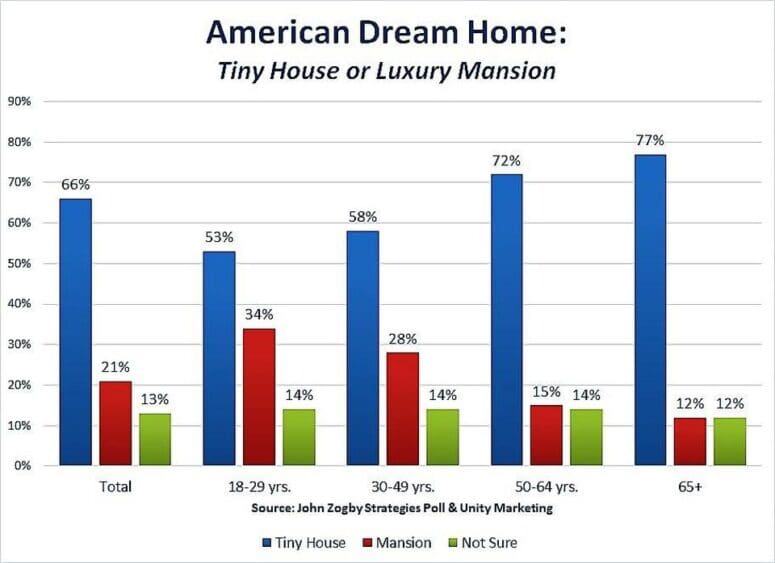What Does it Mean to Downsize Your Home? The Perks and Sacrifices that Come With Smaller Living
- Published on
- 4-5 min read
-
 Catrina Sun-Tan Contributing AuthorClose
Catrina Sun-Tan Contributing AuthorClose Catrina Sun-Tan Contributing Author
Catrina Sun-Tan Contributing AuthorCatrina is a native San Franciscan with a B.A. in Psychology and minor in Cinema and Media Studies from Wellesley College. A storyteller at heart, she loves to write about people, films, and of course, real estate. Don't be surprised if you catch her browsing luxury homes on Instagram or obsessing over the latest market trends.
“The bigger the better!”
“More bang for your buck!”
From the Louisiana Purchase to the 7-Eleven Big Gulp, more space and bigger stuff is an All-American value. A 90-inch TV for your 5,000 square feet McMansion, that’s The Dream, isn’t it?
Well, not anymore…
The National Association of Home Builders reported that new home sizes have steadily decreased over the past three years since 2015. And, when two-thirds of Americans view tiny homes as their dream homes (77% of them are 65 years old and older), people are seeing more value in smaller homes—in other words, downsizing.
So, what does it mean to downsize your home?

Less stuff, less space—in exchange for more freedom
Downsizing is not a call for you to drop everything and buy a 150 square foot tiny house, but more of a realization that you might not need all this space anymore and you’re ready to cut back: both on stuff and square footage.
In 2012, UCLA’s Center on Everyday Families found that people spent 68% of their time in the kitchen and living room, while the rest of the square footage was pretty much wasted.
We spoke to a top real estate agent who has worked with countless home sellers wanting to downsize and compiled our own research on what you should expect when downsizing. Between the lifestyle freedom and financial perks, you might realize that smaller is better if you can get used to smaller living.

Downsizing for you could mean…
1. Cutting down on space to reduce your housing costs.
Tyler Tapley, a top real estate agent who sells 71% more properties than the average agent in Memphis, Tennessee, finds that for many of his clients, choosing a home is about what makes sense for their situation.
“Usually what we see with downsizing is people who want a smaller home. Their kids have left, their family is smaller, and they’re wanting something that’s a little more manageable, less maintenance, and fewer repairs,” says Tapley.
A smaller home sounds like a huge break to your bank account! With college debts, general home maintenance, and hidden housing costs eating away at your paycheck every month, you can lessen your financial burdens with downsizing.
2. Making your mortgage more manageable.
Downsizing to a smaller space means less time and money spent on a mortgage. If you’re stuck in a 30-year fixed-rate mortgage and your debts keep rising, downsizing might be an affordable exit plan that keeps you above water.
Let’s say you have a current mortgage loan of $250,000 with an interest rate of 4.5% over 30 years. You’re paying $1,267 per month. However, if you cut down your mortgage by 40%, dropping to $150,000, you only pay $760 and save $507 every month!
Once you sell your current home, you can use the proceeds towards a smaller home in a less expensive area. This way, you’ll make a profit through downsizing, then afford to either pay in cash or provide a larger down payment.
3. Paying down debt faster and building up your savings.
With the $507 you saved from downsizing every month, you can put it towards paying off student loans and credit card debt.
If you owe $12,000 in student loans with a 6% interest rate and a minimum $110 a month, you’ll spend 12 years paying it off. But, add an additional $500 each month and you’ll finish paying off the loan in less than a third of the time.
On the other hand, money saved can also go towards your retirement savings. As a general guideline, financial advisors recommend people to save 10%-15% of their household income for retirement. Jumpstart your savings with the extra $6,000/year you gained from a smaller mortgage or additional proceeds from your home sale.
4. Saying goodbye to home maintenance and electric bills! Well, half of them.
There’s no escaping that a bigger house just has more upkeep—more dusting, vacuuming, cleaning. If you downsize, expect to spend less time with these chores!
Additionally, the hidden costs of owning a home rest in home maintenance, which can cost on average up to $1,200 per month. With a smaller home, fewer rooms and bathrooms, you can cut these costs in half.
Many of Tapley’s clients take quality of their new home into consideration as well. “It’s less maintenance and less headaches,” says Tapley. “They’re wanting houses with brick that have HardiePlank, so zero maintenance siding with new roofs. They just don’t want to have to deal with it.”
You can spend a bit more on long-lasting products that don’t need as much maintenance as your wooden mansion.
In addition to maintenance costs, downsizing helps to cut down on utility bills, such as energy and water usage. Typically, the utility bill for a 1,000 square foot home costs more than $200 less than a 3,000 square foot home.
Garrett and Claudia Pennington, authors of the blog Two Cup House, cut their electric bill in half when they downsized to a tiny home. Now, you don’t need a tiny home to achieve these kinds of savings. In general, a smaller house uses less heat and electricity.
5. Thinking about your next location, location, location.
If you want to downsize within your city, make sure you aren’t relocating down the block in a booming housing market. The amount you cashed out on with your old home might not even cover the costs of your new smaller home.
So, where should you go?
Urban Land Institute found that 72% of baby boomers in 2013 wanted to live in a smaller house and have shorter commutes in a convenient location.
“They sell their home with an eye on downsizing and moving to other cities, to the beach, downtown. They just want something that’s walkable,” confirms Tapley.
Downsizing can help you move to a location that doesn’t require that you drive long distances or make day-long plans.
A lot of new construction is targeted towards people who want a smaller place, while keeping that neighborhood feel. If you’re a senior homeowner, speak with real estate agent who has experience working with seniors or has the SRES designation who can 1) help with the selling process and 2) assist you in looking for a community that fits your location needs.

Downsizing could also mean…
Wherever you decide to downsize, you’ll have to adjust to a different environment and lifestyle. Your daily routine will be altered and you may have to meet new people (oh no!).
But, your expectations should be based on what your goal was for downsizing.
Is it to retire and travel? Or, live closer to the grandkids?
If you’re spending most of your time cruising around Europe, your lifestyle will probably be centered on vacation planning and resting for a short time at home before flying off again.
But, if you’re on grandparent duties, you’ll be more focused on spending time with family and babysitting.
So, when it comes to downsizing, expect these changes to your lifestyle:
6. Purging up to 50% of your current belongings
Bigger houses tend to come with more space for clutter. And, once you decide to downsize, you won’t have the same amount of space to hoard all of your children’s soccer trophies or your library of self-help books.
HomeLight provides a list of tips on how to downsize when you just have too much stuff. Don’t aim for next level minimalism and toss everything out, but treat this as a guide for how you can live without clutter in your new smaller home.
If you have time, employ the KonMari method, a cleaning and decluttering lifestyle developed by Marie Kondo, author of The Life-Changing Magic of Tidying Up: The Japanese Art of Decluttering and Organizing. It focuses on respecting the things you have and if certain items don’t spark joy, it’s time to get rid of them. Kondo emphasizes that everything in your house should have a home within your home.
But, without time and energy, you might want to hire a senior move manager, who can help with decluttering and getting everything to your new, smaller place. A second opinion on your belongings will help with the downsizing process—you might realize that you don’t need that fifth set of teacups after all.
7. Saying goodbye to a home you’ve lived in for years.
Tapley views downsizing as an inevitable emotional process. “Emotionally, [the house is] important to them and they’ve been in that house forever. It’s hard for them to give it up,” says Tapley.
“They’ve raised their children there, memories there. It’s not a financial issue, it’s more of an emotional or mental issue.”
If this is where you’ve lived for the past decades, you can’t avoid the feelings of loss and nostalgia when packing up. But, what can make it easier is to experience the emotions through a different lens.
Harvard Health correlates the emotional journey of downsizing with the process of mourning—there are stages, but eventually you accept the outcome and find ways to cope.
Maintain meaningful relationships with old friends and family. Engage with your new community and research activities near your new home that you’ve always wanted to try. The loss is more of a gain than you think!
8. Losing the prestige of a bigger home.
When you downsize to a smaller space, you can’t expect the same spacious luxury you were used to in a two-story house with a backyard and front porch. Going from a 4 bedroom, 3 bath to a 2 bedroom, 1 bath is a change that might take time getting used to. In a smaller space, rooms might have dual purposes, like a kitchen-living room… that’s also the dining room.
But, don’t fret—you can still downsize in style! Infuse luxury in your living space without needing 15 feet high ceilings.
No bar? No problem. Store your prized wine on a gold-finished utility cart that you can push around when hosting friends.
What about a study or entertainment? Consider a floating desk with extra shelves for hidden storage or a mounting device for your TV that rotates and collapses the monitor back to the wall.
A smaller home shouldn’t make you feel totally limiting. Sure, you won’t have the same square footage, but use the money you saved from downsizing to make the space enjoyable.

What to expect when you’re expecting… to downsize
Before you sell your current home for a smaller one, ask yourself these five questions, which will put you in the right mindset and help you decide whether you’re even ready for this change.
Expect the above, but also don’t let it scare you. Everyone’s situation is unique and you should talk to a top real estate agent to figure out if this is the best decision to make.
Whatever your reason may be, downsizing can help save money and offer the gift of a more manageable lifestyle.


